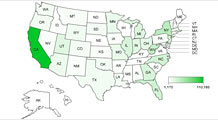Wholesale price report shows inflation in check
May increase is less than economists expect, and annual rate of decline is sharpest since 1949.
NEW YORK (CNNMoney.com) -- Wholesale prices jumped slightly in May, the government said Tuesday, but the increase was less than expected and the 5% annual rate of decline was the sharpest since 1949.
The Producer Price Index, which tracks the changes in selling prices for domestic producers, rose by 0.2% last month. The report is widely watched to monitor inflation.
A consensus estimate of economists surveyed by Briefing.com had forecast a 0.6% increase.
The jump in wholesale prices follows a 0.3% increase in the index in April. January's 0.8% increase snapped a five-month streak of falling prices.
"There's no story on inflation here, and deflation doesn't seem to be a concern," said Anika Khan, economist at Wachovia.
Inflation and deflation: Year-over-year, wholesale prices fell 5%, the largest decline in 60 years.
"That continues to show that even further back in the pipeline we don't have inflation risk," Khan said.
Inflationary concerns rise in tandem with large increases in the so-called "core PPI," which excludes volatile energy and food costs, Khan said. In May, the core PPI edged up by only 0.1%, matching forecasts.
Conversely, deflation is characterized by "broad-based, continued declines in subsectors, which we haven't seen," Khan said.
A 2.9% increase in energy goods prices offset a 1.6% decline in consumer foods, the report said. That's due in large part to gasoline prices, which rose 13.9% following a 2.6% increase in April.
Prices at the pump have increased for 49 straight days, according to a separate survey for motorist group AAA.
Outlook: In the short term, neither inflation nor deflation should occur, Khan said.
"But eventually, we should be taking a watchful eye to the core numbers," she said. "With all of the stimulus spending, inflation should be a problem in the long term." ![]()


